
As health care spending continues to rise, private-duty home care agencies will likely play increasingly important roles in population health management.
In total, U.S. health care spending is expected to reach $4.8 trillion by 2025.
Often, it’s chronic conditions, social determinants of health and functional limitations that drive that spending upward. The combined pervasiveness of those three factors creates a “high-cost trifecta,” according to Cindy Campbell, the director of operational consulting at WellSky.
WellSky is a rapidly growing international software and professional services company with clients that include home health providers, hospital systems, blood banks, labs, hospices, government agencies and human services organizations. The PE-backed company announced plans to acquire CarePort Health from Allscripts Healthcare Solutions (Nasdaq: MDRX) for $1.35 billion on Oct. 13.
Campbell made her comments during a presentation on Tuesday at the 2020 National Association for Home Care & Hospice (NAHC) annual conference.
When thinking about managing health care and expenses over time, the goal should be to deliver care in the least restrictive, least expensive and most satisfying place. This place is the home, according to Campbell.
Broadly, private-duty home care agencies already offer services that address social determinants and functional limitations.
“Home care providers have really been doing this in many ways for a long time,” Lucy Andrews, owner and CEO of At Your Service Nursing & Home Care, said during the presentation. “We know how to support functional needs for people. We know how to keep them home, as they progress through chronic comorbidities, diseases, new diagnoses. We know that incrementally the value of this expertise provides the market with an exceptional opportunity to innovate to be part of this process.”
At Your Service Nursing & Home Care is a Santa Rosa, California-based personal care provider. The company’s services include companionship, respite care, medication reminders, housekeeping and dementia care.
Home care generates considerable cost savings for complex and chronic patients with functional limitations while supporting a compelling business case for its value in population health management. As payers look for ways to reduce spending, the focus may shift to private duty, according to Campbell.
In other words, If population health management isn’t already on a provider’s radar — it should be.
“The first thing to do is really understand why this matters,” Andrews said. “We have the ideal platform because we have supply and demand.”
When it comes to population health management, having access to data and analytics that can reflect performance will be important for providers.
“How are you ultimately going to measure your success?” Campbell said. “What are those key performance indicators that you’re going to be looking for? These are the outcomes that you want to achieve. Think of the value proposition to a managed Medicare or managed Medicaid program, or to human beings in general, if we reduce hospitalization rates. That’s a good measure.”
Other potential performance indicators for private-duty home care agencies are emergent care rates, plus patient and family satisfaction scores. Any metrics related to a provider’s ability to keep patients in the home are also critical.
In population health models, it’s also important for providers to be able to identify when their high-risk patients are most at risk.
“Make sure that you’re looking within your organization at how you quantify risk for the people you serve,” Campbell said. “Who is in that top percentage of need out there that you want to focus on in your program?”
For providers, this could mean addressing transportation needs, risk of medication non-compliance, home-safety concerns and more.
Additionally, it’s important for providers to learn how technology can support their business.
In cases where a provider is caring for someone with chronic obstructive pulmonary disease (COPD), for example, having the right telehealth solutions in place can make a real difference, according to Campbell.
“We know that there’s a challenge within COPD, and solutions that employ and integrate telehealth really [can help] make it work,” she said. “If we can add messaging to that, really adjusting and fine-tuning the dial through this type of a virtual platform, then we can help people adjust in real-time to their needs, stabilize condition and reduce their readmissions.”
Overall, the COVID-19 emergency has placed home care in the spotlight. It’s the perfect time for providers looking to gain a “seat at the table,” Melanie Stover, owner of Home Care Sales, also said during the presentation.
“The time is now,” she said. “It is an urgent time to skill up and put metrics in place so that you can serve more clients, impact more families and increase your revenue. We have been incrementally moving the agenda of home care forward.”
Home Care Sales is a Fairhope, Alabama-based home health, hospice, and private-duty home care sales consulting firm.
"care" - Google News
October 21, 2020 at 10:30PM
https://ift.tt/2FO48lE
Private-Duty Home Care Providers Poised to Play Leading Role in Pop Health Models - Home Health Care News
"care" - Google News
https://ift.tt/2N6arSB
Shoes Man Tutorial
Pos News Update
Meme Update
Korean Entertainment News
Japan News Update
Bagikan Berita Ini














0 Response to "Private-Duty Home Care Providers Poised to Play Leading Role in Pop Health Models - Home Health Care News"
Post a Comment